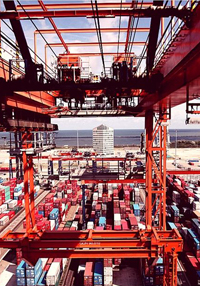Elected officials and selected bureaucrats are given a huge amount of power to act on behalf of the public – modern democracies function on this basis: that citizens hand over their power to elected representatives. But how can citizens then protect themselves against those individuals misusing that power? This is the perennial problem of governance. The simple answer that is given to this question of governance, is “elections” – that elections ensure the displacement of politicians who violate the public trust, and thus create political incentives for better behaviour. This Insight provides an example, which explains why the answer cannot be that simple – the behaviour of officials during elections can both abuse public trust, as well as benefit these officials politically. As such, other governance solutions are needed.
මෙෙ අධයයනය සිදු කරන ලද්මද් මවරිමේ පර්මේෂණ (Verité Research) ආයතනමේ ආර්ික පර්මේෂණ කණඩායෙ විසිනි. සුභාෂිණි අමේසිිංහ (ආර්ික පර්මේෂණ ප්රධානි), නිලිංගිකා ප්රනාන්දදු, මර්වතී ඥාණසම්බන්දදන්ද සහ සීzනා හුමසේන්දමෙන්ද සැදුම්ලත් ලත් සාොජිකයින්ද පිරිසක් මෙෙ කණ්ඩායෙට ඇතුළත් විය. මෙෙ වාර්තාව සකසේ කිරීමම්දී පර්මේෂණ කටයුතු සඳහා සහාය ලබාමදමින්ද සෙසේත පර්මේෂණ සහ කර්තෘ අධීක්ෂණ කටයුතු සිදු කරන ලැබුමේ නිශාන්ද ද මෙල් විසිනි. ජාතික අපනයනකරුවන්දමේ ෙණ්ඩලමේ (NCE) සහාය ඇතිව මවරිමේ අයතනය ෙඟින්ද මෙෙ පර්මේෂණ වාර්තාව සකසේ කරනු ලැබිණ. සාර්ථක ෙඟ මපන්දීම් තුළින්දද සම්ුඛ පරීක්ෂණ සඳහා පහසුකම් සපයමින්දද සාකච්ඡා අිංෙ සඳහා සහභාගී මවමින්දද මෙෙ පර්මේෂණ කාර්යය ඉටු කර ෙැනීමෙහිලා දැක්ූ සහමයෝෙය සම්බන්දධමයන්ද ජාතික අපනයනකරුවන්දමේ ෙණ්ඩලය මවත මවරිමේ පර්මේෂණ ආයතනමේ ආර්ික පර්මේෂණ කණ්ඩායෙ සිය සේූතිය පුදකර සිටි.
Most people in a country don’t understand the intricacies of exchange rate management. Nevertheless, actions in this regard have significant implications for the economic stability, growth and overall success of the economy, on which human development is fostered. This Insight explains how a professional approach to the management of the exchange rate seems to have been trumped by political considerations for much of 2015. The losses suffered by a lack of professionalism are not too different to the losses suffered due to corruption, and the lack of professionalism and corruption tend to be parasitic on each other. Therefore, this Insight also points to an important focus that has not yet been adopted by the agenda for good-governance.
“In the context of growing bilateral relations with India, this study by Verité Research takes a look at the current status of Sri Lankan exports to India under the existing India – Sri Lanka Free Trade Agreement (ISFTA). The study identifies Non-Tariff Barriers to be a critical factor in the lackluster performance of exports to India in recent years. The case of food exports serves to highlight how compliance with Indian standards and regulations forms one such significant barrier, due to India’s non-recognition of testing and certification conducted outside its borders. The proposed solution to this problem – a Mutual Recognition Agreement – is one that is easily implementablewhich will help exporters enjoy the full benefits of duty concessions offered by the ISFTA and if done right, will help build confidence in the benefits of further integration.”
“In the context of growing bilateral relations with India, this study by Verité Research takes a look at the current status of Sri Lankan exports to India under the existing India – Sri Lanka Free Trade Agreement (ISFTA). The study identifies Non-Tariff Barriers to be a critical factor in the lackluster performance of exports to India in recent years. The case of food exports serves to highlight how compliance with Indian standards and regulations forms one such significant barrier, due to India’s non-recognition of testing and certification conducted outside its borders. The proposed solution to this problem – a Mutual Recognition Agreement – is one that is easily implementablewhich will help exporters enjoy the full benefits of duty concessions offered by the ISFTA and if done right, will help build confidence in the benefits of further integration.”
මෙම සියවස ආරම්භයේ සිට ශී්ර ලංකාවේ අපනයන එහි දළ දේශීය නිශ්පාදිතයේ ප්රතිශතයක් ලෙස පමණක් නොව ගෝලීය අපනයනවල ප්රතිශතයක් ලෙස ද, පහත වැටී තිබේ. නිදහස ලැබුණු වකවානුවේ දී, වර්තමානයට වඩා ඉහළ ගෝලීය වෙළදපොළ කොටසක් අත්කර ගැනීමට ශී්ර ලංකාවට හැකිව තිබුණි. මෙම අධ්යනය ශී්ර ලංකාව මෙතෙක් කල් මුහුණපා ඇති බාධක මැඩපැවැත්වීමට සහයෝගයක් ලබාදිය හැකි ප්රතිපත්ති යෝජනා හදුනාගැනීමට දරණ ප්රයත්නයකි.
This study examines the status of the export finance market in Sri Lanka and identifies the key limitations that prevent export finance from playing a proactive role in promoting exports. It reveals that the access, availability and diversity of export finance in Sri Lanka is limited and the few export finance solutions that are available remain weak and under-utilised. Export finance solutions reduce the risks faced by exporters such as country and commercial risks, encourage diversification into developing country markets, helps SMEs manage short term cash flow issues and allows exporters to attract buyers by offering better payment terms. By doing so, export finance can help promote exports.
This study examines the status of the export finance market in Sri Lanka and identifies the key limitations that prevent export finance from playing a proactive role in promoting exports. It reveals that the access, availability and diversity of export finance in Sri Lanka is limited and the few export finance solutions that are available remain weak and under-utilised. Export finance solutions reduce the risks faced by exporters such as country and commercial risks, encourage diversification into developing country markets, helps SMEs manage short term cash flow issues and allows exporters to attract buyers by offering better payment terms. By doing so, export finance can help promote exports.
Variations in the tobacco excise tax affects Rs. 10s of billions in government revenue. Taxation and pricing has been inconsistent. The lack of a consistent method allows wide discretion to officials in determining the tax. Parliament should adopt a formula to keep taxation in line with national policy, treat stakeholders fairly, and prevent discretion from being abused.






